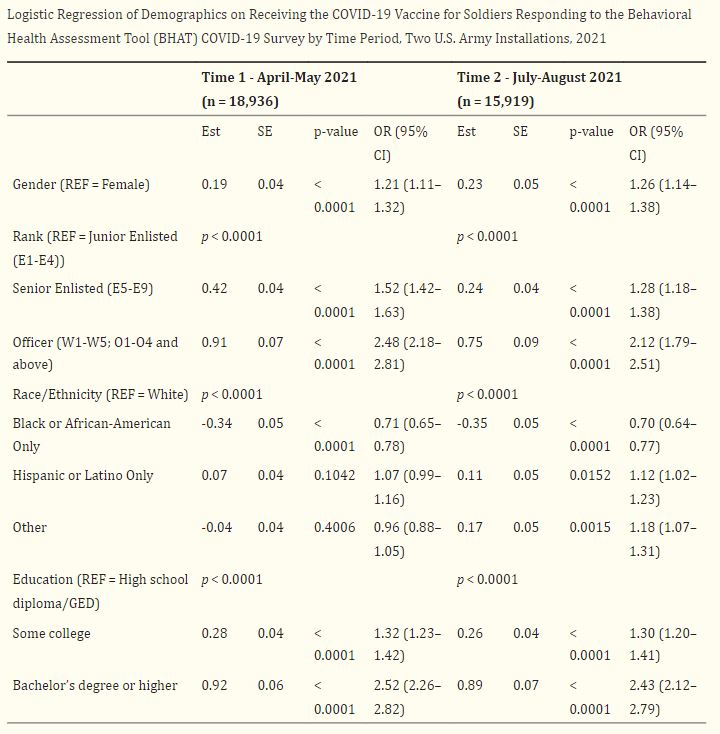ABERDEEN PROVING GROUND, MD — Soldiers who agree with COVID-19 vaccination effectiveness, safety or importance, as well as soldiers who have an immediate supervisor who encourages them to get the COVID-19 vaccine, are more likely to get vaccinated, according to a new study.
The study published in the Journal of Community Health examined how demographic, attitudinal and leadership factors were associated with COVID-19 vaccination rates, vaccination intentions among those not vaccinated and attitudes about vaccination safety, effectiveness and importance.1
Over the objections of DoD officials and the White House, the COVID-19 vaccine mandate was rescinded last month as a trade-off for passage of the National Defense Authorization Act (NDAA) for FY 2023.
The anonymous online survey was administered to all active-duty soldiers at two large U.S. Army Divisions located in the southwestern United States at two separate time points. At Time 1 (April to May 2021), 41% of eligible participants (24,629 soldiers) completed the survey. At Time 2 (July to August 2021), 35% of eligible participants (21,116 soldiers) completed the survey.
The Walter Reed Army Institute of Research and U.S. Army Public Health Center developed the Behavioral Health Advisory Team (BHAT) COVID-19 Survey to comprehensively assess the behavioral and public health impact of the COVID-19 pandemic on soldiers and their families. They administered the BHAT COVID-19 Survey electronically to active duty soldiers at the two U.S. Army Divisions participating in the study.
In August 2021, voluntary COVID-19 vaccination rates were low enough that the U.S. Secretary of Defense mandated vaccination for all servicemembers. Despite the mandate, about 1.5% of active duty military didn’t get vaccinated by the Dec. 15, 2021, deadline. For the U.S. Army, 98% of active duty military had received at least one dose of a COVID-19 vaccine before the deadline, but about 3,800 had refused the vaccine.
“Soldiers who agreed with three separate statements on COVID-19 vaccination effectiveness, safety or importance were more likely to indicate that they intended to get the COVID-19 vaccination at both time points,” Matthew Beymer, PhD, MPH, statistician at the Aberdeen Proving Ground, MD, Defense Centers for Public Health-Aberdeen (formerly Army Public Health Center), told U.S. Medicine. “Soldiers who reported that their immediate supervisor encouraged soldiers to get a COVID-19 vaccine were more likely to indicate that COVID-19 vaccination was effective, safe or important at both time points.”
About 43% of soldiers reported they received a COVID-19 vaccine at Time 1, and the percentage of soldiers increased to 67% at Time 2. About 1 in 3 soldiers agreed or strongly agreed that vaccination would help decrease the spread of COVID-19 (effectiveness) or that getting the vaccination is an important step in combating the pandemic (importance). One in 4 soldiers agreed or strongly agreed that vaccination is safe (safety) at both time points.
Male soldiers, senior enlisted personnel and officers/warrant officers, as well as soldiers with higher educational attainment, were more likely to report they had received the COVID-19 vaccine at both timepoints, according to the study.
Certain groups of soldiers were more likely to have vaccine hesitancy. At both timepoints, participants who were female, junior enlisted, Black or African American, and those with a high school education or less were less likely to have received a COVID-19 vaccination. When analyzing COVID-19 vaccination intentions, disagreement with statements on effectiveness, safety or importance were significant predictors of not intending to receive a COVID-19 vaccination.
In addition, junior enlisted, non-Hispanic whites and those with a high school education or less were more likely to have disagreement with statements on COVID-19 vaccination effectiveness, safety or importance, Beymer explained in an email.
Non-Hispanic whites were more likely than non-Hispanic Blacks to report receiving the vaccination, the study reports.
“The current study demonstrated that participants who agreed with COVID-19 vaccination effectiveness, safety or importance were more likely to intend to get vaccinated,” Beymer wrote. “Healthcare professionals can focus on conveying messages that convey the personal and communal health benefits of COVID-19 vaccination to decrease vaccine hesitancy.”
“In addition, this study found that participants were more likely to intend to be vaccinated if they either agreed or strongly agreed with the statement that their immediate supervisor, ‘Encourages soldiers to get a COVID-19 vaccine.’ Therefore, line-level leaders may serve as a robust conduit for increasing vaccination intentions and uptake among U.S. soldiers.”
“Specifically, our findings suggest that immediate supervisors directly encouraging their soldiers can have a positive effect on increasing COVID-19 vaccination uptake,” Beymer explained.
- Beymer, M.R., Gomez, S.A.Q., Santo, T.J. et al. COVID-19 Vaccination Attitudes and Intentions Among U.S. Soldiers: Results from the U.S. Army Behavioral Health Advisory Team (BHAT). J Community Health (2022). https://doi.org/10.1007/s10900-022-01149-6

